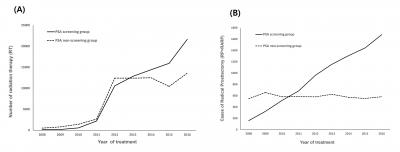|
Cancer - Prostate(구연)
|
(E-101)
|
|
|
전립선암에 대한 인식이 보편적이지 않은 나라에서 반복적인 PSA 선별검사는 그 치료패턴에 영향을 미치는가: 건강보험 데이터 연구 |
Department of Urology, College of Medicine, Yeungnam University, Daegu, Republic of Korea¹
Medical Research Center, College of Medicine, Yeungnam University, Daegu, Korea² |
| 고영휘¹, 김상원 ²¹¹ |
Purpose: To investigate the real-world prevalence of repeated prostate specific antigen (PSA) screening in Korea and its influence on the treatment pattern of the prostate cancer (PCa) over the last decade, during which PCa has become the 3rd most popular male cancer and PSA test has gained minimal social interest.
Materials and Methods: From Korean health insurance data, men with newly diagnosed PCa from 2008 through 2016 were identified, then the treatment modalities between the repeated PSA screening (defined as at least three PSA tests during minimal 2 years before registration) and non-screening groups (when the first PSA test was performed within 3 months before registration) were compared.
Results: Among 73,280 men with PCa, only 27.7% met the criteria for screening. In contrast with the continuous increase in the screening population from 334 men in 2008 to 5,049 men in 2016, the non-screening population remained low at 1,543 men in 2008 and 1,819 men in 2016 (p<.001). During these periods, more patients underwent local therapy (prostatectomy or radiation) in the screening population compared to their non-screened counterparts (59.8% vs 46.7%, p<.001), and fewer patients underwent systemic therapy (chemotherapy or hormone) (40.2% vs 53.3%, p<.001). Multivariate analysis adjusting other variables demonstrated 2-fold higher mortality in the non-screening population (HR=2.05, p<.0001).
Conclusions: Among the patients newly diagnosed with PCa, only about a quarter received repeated PSA screening. However, these patients showed a higher probability of local treatment than the systemic one as well as prolonged overall survival in comparison with non-screened counterparts.
|
 |
|
keywords : Prostate cancer, screening, prostate specific antigen |
|

